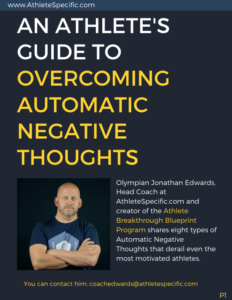Several years ago, I worked with an aspiring tennis player who was quickly outgrowing his ‘local’ tennis options. While the coaching and competition at home were…good for this athlete to kick things into gear and reach his potential…it was time to move somewhere with better coaching and better competition.
(Warning: Author and Olympian Jonathan Edwards works with aspiring athletes and their families who are chasing big athletic dreams. The advice in this article, or his videos, may be hard to understand for those who do not have those lofty pursuits. Please consider this when leaving comments on this article.)
In a sport like tennis, this is not an uncommon pursuit. Families have left countries to pursue their athletic dreams and progress up the rankings. But for this family, the idea of moving or having to split up the family so the father could remain working in their current city was a non-starter.
A few years later, I heard from the mom who said to me, “You know, when you mentioned that we needed to move Chase to get around better competition and coaching, I was shocked. But really, I knew it was coming. I just didn’t want to address it. I just really wish we HAD moved so Chase could have lived out his dream.”
Whether it’s moving across states or country lines, switching schools, changing diets or coaches, investing in equipment, or (on the extreme example) taking performance-enhancing supplements, athletes are always faced with a battle between their current values the performance they desire.
All-In. (I think)
I met a mom in a local mall food court who told me her son had dreams of becoming an Olympic weightlifter. I asked her how familiar she was with performance-enhancing drugs since the sport is now at risk of losing its Olympic status due to widespread doping.
Her answer…” Oh my God, my son would NEVER do that. We’re vegan. He barely takes a Tylenol!”
“Well…”, I said, “He might want to consider using his current strength and athleticism in another sport.”
Now before you think I’m condoning performance-enhancing drugs, I’m not. Like the many parents, athletes, and coaches, I want to see clean athletes competing fairly. But an athlete would be naive to think that his global weightlifting competitors might not be playing so fairly. His local competitors may be clean and subject to local drug testing in his country, but competing at the highest level seems to come with a need for additional…how should we call it…” help.”
When I explained this to the mom, she said, “You know, I’ve never really thought of this. He just loves weightlifting. We are all-in on weightlifting. Or so I thought.”
Whether your sport is weightlifting or curling, ice hockey or field hockey, football or lacrosse, as you pursue your athletic dreams, you will run into that collision of values and performance.
We love weightlifting, but I would never take performance-enhancing drugs.
“I love hockey, but I could never live away from my parents.”
“I love skiing, but I would never mortgage my house to compete on the World Cup.”
“I love tennis bus would never move to Dubai to train with the best.”
“I love lacrosse but could never play at a Catholic University.”
The last one was a consideration I made when I was pursuing my collegiate lacrosse career. I had never even thought that a Catholic school would be a factor for me. I wasn’t Catholic. Didn’t go to a Catholic high-school. And, at the time, I was quite turned off by the Catholic influence on every aspect of my collegiate day that it kind of pushed me away.
I was all-in on my dream to play Division One lacrosse, so I thought. But at that point, my values of how I wanted my day to be and how I thought it would be affected by this setup didn’t feel great.
However, looking back, I wish I had more mentors to have helped me with that decision.
Having Mentors Helps With Values
As athletes, we are always pushing our performance, but to compete at the next level, we now have to deal with new values that we didn’t even know existed before.
When the American Skiier Mikaela Schiffrin first made the US World Cup team, her mom came along as her coach. “I can’t imagine doing this without my mom,” she said.
But what if she HAD to do it without her mom. What if the US Ski Team had a rule that, no way, EVER, do we allow parents on the coaching staff of the US Ski Team. Would we be watching the most excellent skier in history ski today?
As athletes pursue their sport, they are a neurochemical cocktail of adrenaline, dopamine, and other feel-good chemicals that course through their bodies daily. They aren’t in the headspace to want to manage bad coaching or big moves. They are happiest when they are competing.
That is why parents must always be on the lookout for other coaches and other parents who can help light the way. But understanding those coaches’ and parents’ values is also essential because they may not be the same as your own.
How you spend money is a value. How far you travel is a value. Who you associate with are values. How much time you spend on the sidelines or in the stands is a value.
Having someone who can help you look down the road and tell you, “Well…when they get to THIS age/stage, you’re going to have to consider…x, y, and z.”
You may be good with x and y, but z? You’re going to have to think about z.
Dealing With Coaches
Coaches are sometimes a decision you have no choice in.
Positively, I know many athletes in different sports who will move to work with a particular coach. This happens in tennis a lot, where families will uproot their athletes and move them across state lines to work with a specific coach.
Gymnastics is also another sport where parents will move to work with a specific club because the coaching is solid.
(Update: ARTICLE CONTINUES BELOW: As of 2/26/2021 yet another, prominent USA gymnastics coach has been charged with the most horrendous abuse charges ranging from sexual to verbal and everything in between. On the other side of the pond, UK Gymnastics is going through a similar mess of soon-to-be hundreds of former and current athletes who have stories of sexual, physical, and verbal abuse. I hope that these charges will shed light on the fact that parents should not feel compelled to turn their athletes over, unchecked, to coaches. While you can respect the technical and tactical coaching abilities of a coach, you can never forget that they are people and those people have flaws. Sometimes tragic flaws.
We want the best from our coaches; however, it seems more often than not, some coaches are deeply troubled inside. They are often dealing with their demons that they take out on their athletes. This is unacceptable. I want all of my athletes and their families to understand that hurt people hurt people. This does not condone their actions, but it gives athletes and their families the green light to stand up as soon as something happens. The relationship between an athlete AND THEIR PARENTS OR GUARDIANS IS PRIMARY.
We are at a crossroads where there MUST be a safe third-party for our athletes of all ages to talk to someone and ask…” Is this ok?” That’s why I recommend all of my athletes have some sort of Mastermind group where they can talk freely and know what falls in and out of acceptable coaching behavior. Sadly, this isn’t always obvious to some coaches.
However, we all know a coach may start to wield a power over an athlete that they are now a conduit to their success instead of a facilitator of it. High-performance sports dynamics aren’t conducive to everyone sharing how they feel, as it may lead to a coach losing a job or an athlete losing their spot on a team. While I wish that weren’t true, it often is that a hard-nosed coach who is hard-nosed but not abusive is precisely what an aspiring athlete needs.
We are past the stage where parents can turn a blind eye, yet many of those same parents lack the ability to confront a terrible situation. Not many people thrive in confrontation. As a matter of fact, I think many parents would say they avoid it. Confronting abuse is probably one of the most significant hurdles a family could have to deal with, so it’s no surprise to me things have gone on for so long in some of these stories.
As tragic as this has been, I’m encouraged by what has come of it: more awareness for parents and athletes that sport is a people business, how we work with people. Care for them. Motivate them. And encourage them to be better than they are, is a complicated and challenging task. As I always say, people’s issue with coaches is rarely their lack of technical or tactical knowledge. It is who they are as people that cause the problems. Sometimes tragically.
While this article was not intended to address my thoughts on this fully, I hope this gives a bit of hope to athletes and families looking to pursue their sport at the highest levels. )
Article continued:
But in a sport such as ice hockey, an athlete may get traded from one team to another and have no choice but to work with the coach of that team. Whether they like it or not.
Along the way, though, values may collide with performance, especially if performance isn’t up to the coach’s standard. Coaches may resort to any and all tactics they are familiar with to get more performance out of the athlete.
Coaches my encourage, berate or cajole. They will find ways to incentivize on one end of the spectrum and demoralize on the other to find something to help kickstart the athlete’s performance.
This is where values can, what I call, “slide and collide.” Values can slide on a scale of sorts. Today, your tone with me might be manageable, but tomorrow I think you’re a jerk and should be fired from this club, and your livelihood should be taken away.
The reality is that for some athletes, the coach is beloved. For others, the coach should be drawn and quartered.
The bottom line is that an athlete thinks to themselves, “I’ll deal with that, but THAT crosses the line.”
What is happening is that it is not “THE line.” It is “MY line.” What is “MY line”? It is your value line. Every athlete, parent, or coach has one, and it’s best to know ahead of time what the line is, where it’s located, and when it might be crossed.
I encourage all of my athletes and parents to think far enough down the road that they can foresee some of these lines they may have to deal with. Some are predictable, others…not so much.
Adulting
For many of our aspiring athletes, they are kids. You can have kids at twelve. You can also have athletes who are still “kids” at twenty-five. Heck, I work with some coaches who are still kids at fifty-five. They’ve never grown up.
These coaches are tremendous technically and tactically. They can know every trick in the book to take an athlete to the next level. But personally. Socially. They often lack specific “adult” skills we all wish they would have.
This is where we need our athletes to be prepared to work with coaches like that or raise red flags to their parents and the appropriate parties when things seem off.
But many athletes are entirely unprepared for this role. That is why the relationship between athlete and parent is so important. And then the role between parent and coach is equally important. It is a three-sided “team.” And we know that a triangle is always more powerful than a line between two points. One holds weight, the other snaps when the stress is too great.
Many parents give their athletes to their coaches and say, “Here…they are yours now.” Abdicating all responsibility of somehow managing the relationships, but I believe this is a big, big mistake.
As parents, you must look at the coach as a “tool.” Not a TOOL, but a tool to help your athlete on the way to THEIR best performance. Results like gold medals come after great performances, so the focus will always be on the performance and not the end result. You can’t control the outcome, but you CAN control how you get there.
However, for the coach and the program, results matter. Always.
It’s one thing for athletes to be able to perform. It’s another thing to ask a young athlete to somehow advocate for themselves when things get complicated. I rarely see an athlete with those skills at young ages. They are focused solely on performance, don’t yet know (honestly) what their values are, and don’t want to rock the boat.
It can be a recipe for disaster.
Values Despite The Rules
Unfortunately, at every Olympic Games, athletes are caught for doping. This is just one small example of people saying, “I value winning despite the rules in place.” It’s why, I guess, we have those rules.
In 2002, the Canadian Figure Skating pairs team of Jamie Sale and Scott Pelletier lost the gold medal to the Russians.
Immediately after the scores were announced, something didn’t feel right. The fans in the arena could see that the Canadians had skated better that day and let the judges know it.
Over the next five days, it was revealed that the French judge had scored the Canadian pair deliberately lower because she had agreed to help the Russians win that event in exchange for the Russian judge allowing the French team to win in a different event.
The scandal rocked the sport resulting in the French judge being banned for three years, including the next Olympic games.
Ultimately, the Canadians were upgraded from silver to a dual-gold with the Russians.
It was weird.
And while athletes take oaths to compete fairly, and judges take oaths to judge fairly, people act based on their values, and it’s important NOT to be naive to that.
When The Game-Behind-The-Game Feels Like It Has Changed
For many athletes and their families, what they thought the path was going to be, ends up not being the path at all.
It gets steeper. Bumpier. More slippery. More challenging than the athlete and their family ever imagined.
The training is more challenging. Their coaches are more authoritarian. The overall feel’ goes from fun and happy to hard and sometimes downright painful.
Coaches are there to push and encourage athletes to be more, do more, and have more than THEY think is possible.
It is here that many athletes miss the message. Instead of getting better, they wish the path was smoother. Not as steep. With friendlier coaches and judges around them.
This is when an athlete and their family get smacked in the ‘values.’.
Instead of pushing on and looking for additional solutions, they blame the course. They blame the coaches. They blame the environment, their equipment, and even their teammates.
Inside they grieve because they feel their athletic journey may be coming to an end, and it’s everyone’s fault…but theirs.
What was once ‘tough-love’ by a coach is now ‘abusive.’ Yet, there are always other athletes who like that coach. Who are driven by him or her. Who enjoy the environment. Who are willing to push through because they feel it is all helping them on the way to their goals.
Again…values and performance collide.
Bob Bowman, the swim coach who helped turn ten-year-old Michael Phelps into the greatest Olympian in history, tells the story of athletes who came to train at his facility over the years.
Many were caught off guard by the rigorous training methods at his facility. The demanding coaches. Others deliberately sought that environment out, knowing that it was what they felt they needed to win.
And they did.
Even already-Olympic champions sought Bob Bowman and often moved from wherever they lived to Maryland to train at his training center.
But as hard as it is, Bob Bowman has a trait that many hard-driving coaches don’t have. The ability to adjust their approach. (this goes back to the “Adulting” section earlier.)
In Bob’s book The Golden Rules, he tells the story of Cierra Runge.
At 15 years old, Cierra was already six feet, three inches tall, and was having difficulty keeping up with the other athletes her age. She had plenty of talent but hadn’t trained in the ultra-intensive way they do in Bob’s program. When competitions came, the pressure made her break.
Bob’s assistant coaches drew up programs and training splits to push Cierra, but it wasn’t working. That’s when he realized she might be better at longer distances and not the shorter ones she was struggling with.
Not wanting to offend his coaches, he had them back-off and retooled her programs. Bobs’ words…” our job is not to keep the perfect athletes, and get rid of the imperfect ones…it’s to try to have everybody move to his or her potential. Otherwise, there’s going to be a day when there isn’t anybody left to coach.”
Now before you go all sweet on Bob Bowman, he also says that in a program of over two hundred athletes, his coaching staff doesn’t have the time or ability to give everyone equal attention. There has to be considerable effort and persistence shown on the side of the athlete.
While an athlete or their parents may feel they are giving it their all, sometimes their potential is not great enough to stay.
And that’s hard to digest.
There will come a day when an athlete has to step away. For most, it comes much earlier than they would have liked. But it is at that point an athlete will set themselves up for life when they say, “I gave it my best under the environment I was in. It didn’t work out. What is the NEXT challenge I am going to undertake?”
Staying On Track
When an athlete, and their family, truly commit to being the best in their sport, many of the problems associated with catty teammates, abusive coaches, and other soap-operas tend to fall by the wayside.
However, values are things that pop up at the strangest of times. You may be confronted with things that go against your values. That is something to be IMMEDIATELY discussed between athlete and parent. Immediately. Did I say…immediately.
But first, a warning. For most athletes, the idea that a newly discovered value may derail something that they love on the way to a dream they have been pursuing can cause them to not talk about it. To let things fester and grow.
This is where athletes will stay in abusive situations at the expense of their health, their mental well-being, and any number of other things, just to keep performing on the way to their goal.
But when an athlete and their family are true to their goals, the question that always helps is, “Is this environment (people, places, or things) helping me to my goal?”
If the answer is yes, then values align. If the answer is no, then values change the course.
Be So Damned Good
My advice to all of my athletes and their families to aim to be so damned good that they HAVE to pick you.
Even when the Canadians were given the silver medal at the Olympics…
Even when the Russians made a small mistake that made the competition close…
The reality is that the Canadians weren’t able to perform so well that there was ZERO question a judge could call it close and give the gold medal away.
Your goal as an athlete is to train so well and so hard that there is no question what team you make. What medal you win. You take the decision out of people’s hands no matter what they may value.
Mahe Drysdale is one of the greatest Olympic rowers of all time. In 2008 a stomach bug caused him not to perform at his best, and he finished third, winning the bronze medal.
After the race, a reporter said, “Well, next Olympics, you’ll be healthy and win, right?”
His reply was excellent. He said, “Nah…I’m going to train so hard that I’ll win even if I’m sick.”
And he did.
Values Are Yours and Yours Alone
I remember meeting some of the US Alpine Ski Team before opening ceremonies at my first Olympics. They thought we were crazy for competing in luge, flying on our backs, feet first, at speeds of 125 kilometers per hour. We thought they were crazy for competing in skiing, standing on two feet at speeds of 125 kilometers per hour.
In some strange twisted way, we both valued our own safety enough NOT to try the other sport.
I’ve never forgotten that conversation because it has always been a reminder that what we value is very personal. It can sometimes be the same thing, in this case, our health. But we value it differently.
It’s also essential to understand that when performance is good, values shift. When performance is bad, values can also shift.
There is no way to cover all of the possible situations here. Just know that coaches who you tolerated when performance was good are quickly thrown under the bus when performance wanes. Even when the performance is 100% controlled by the athlete.
When performance is good, being away from home and friends and family can seem normal. When performance is bad, your values can start to pull you out when you ask yourself, “Is it all worth it?”
We do the best with what we know…at the time.
Over time, values can change. As we experience new people, places, or things, that exposure influences our values, and it’s critical we remember that.
When you started this journey, you may have to know certain things, but new experiences reveal new values as you go further down the path. It’s like sand dunes that are always changing.
Some values may change, others may pop up that you were completely unaware of. Either way…just know that values and performance will always collide, in sport, as in life.
Good luck.
Join The #1 Mental Performance Coaching Program For Aspiring Athletes
US Olympian Jonathan Edwards set out to create the world's only mental performance coaching program specifically for aspiring athletes with big dreams and their families. If you've got an athlete with big dreams and you want the Insurance Policy to help make their athletic dreams come true...book your call today.

Olympian Jonathan Edwards
Founder - The Athlete Breakthrough Blueprint
Olympian Jonathan Edwards is the Creator of "The Athlete Breakthrough Blueprint": The world's only mental performance training program for aspiring athletes with big dreams. Over nineteen years he has worked with athletes who have gone on to or competed in NCAA D1, D2, D3, MCLA D1 and D2, the Olympics, NHL, MLL, NLL, NFL, and others. Feel free to link to this article from your blog and share it with an athlete, parent, or coach who would benefit from these concepts.

